Loretta
Lynn

-
Inducted1988
-
Born
April 14, 1932
-
Died
October 4, 2022
-
Birthplace
Butcher Holler, Kentucky
Remembering Loretta Lynn, 1932-2022
“The story of Loretta Lynn’s life is unlike any other, yet she drew from that story a body of work that resonates with people who might never fully understand her bleak and remote childhood, her hardscrabble early days, or her adventures as a famous and beloved celebrity. In a music business that is often concerned with aspiration and fantasy, Loretta insisted on sharing her own brash and brave truth.”
—Kyle Young, CEO
Country Music Hall of Fame and Museum
Beginnings in Kentucky
Loretta Lynn’s life story reads more like fiction than fact. A poorly educated woman from the coal-mining hills of Kentucky, married at age fifteen and a mother at sixteen, she became one of country music’s most popular performers and broke ground for numerous female singers who followed her.
By telling her own truths, and by writing about her experiences with a perspective and voice unlike any other Southern storyteller, Loretta Lynn become an American hero and a country music standard-bearer. She was born Loretta Webb in a one-room log cabin and was the second of eight children. Her father was a coal miner in the rural coal town of Butcher Holler.
At fifteen, she attended a pie social, bringing a pie she had baked using salt instead of sugar. The highest bidder not only won the pie but also got to meet the girl who had baked it. Doolittle “Mooney” Lynn had just returned home from the army. A month after they had first met, and three months short of her sixteenth birthday, Loretta and Mooney married.
A year later, the couple moved to the state of Washington, after Mooney had heard job opportunities were better there. It was the first time Loretta had been away from home. Mooney found work while Loretta, at age sixteen, became pregnant with their first child. By the time she was twenty-two, she had four children.
Loretta had grown up listening to country music and often sang around the house. Her favorite singer was Kitty Wells. Mooney bought her a $17 Sears guitar so she could play as she sang. Later he helped arrange an engagement at the local Grange hall, bragging that his wife could sing better than anyone except Kitty Wells. Soon Loretta was performing with a local band and within months formed a band of her own.
00:00 / 00:00
00:00 / 00:00
00:00 / 00:00
Videos
“Don’t Come Home a-Drinkin’ (with Lovin’ on Your Mind)”
The Wilburn Brothers Show, 1966
Somebody Touched Me
Loretta Lynn Begins Recording
Lynn came to the attention of Zero Records, a small firm in nearby Vancouver, British Columbia, Canada. The label signed her in February 1960 and sent her to Los Angeles to cut four songs. After the session, she and Mooney stayed until the records were pressed and then mailed them to country radio stations. Loretta and Mooney then hit the road for Nashville, stopping at stations along the way to promote her rendition of “I’m a Honky Tonk Girl.” The record began getting airplay and reached #14 on the country music charts in 1960. On the strength of this hit Lynn gained a first appearance on the Grand Ole Opry, on September 17, 1960.
One of Lynn’s first stops in Music City was the office of the Wilburn Brothers. Teddy and Doyle Wilburn were a top country vocal duo whose enterprises included a music publishing company, a booking agency, a syndicated television program, and a touring show. Recognizing her talent, Doyle Wilburn made her a part of the Wilburns’ road show and a regular on their television series. He eventually secured Lynn’s release from Zero Records and persuaded Decca Records, for which the Wilburns recorded, to sign her. Later, Lynn’s desire to assume full control of her career led to conflicts with the Wilburns. A lawsuit settled matters, and eventually they resumed their friendship.
Two years after “I’m a Honky Tonk Girl,” Lynn began scoring additional hits, including “Success,” “Before I’m Over You,” and “Blue Kentucky Girl.” But it wasn’t until she wrote and recorded “You Ain’t Woman Enough” and “Don’t Come Home a’Drinkin’ (with Lovin’ on Your Mind)” that Lynn’s music took a new direction. Her songs became more assertive, and the country girl from the Kentucky hills, who was raising a family of six, spoke more boldly and forcefully than many would have expected. Still, the humor of songs such as “Fist City” and “Your Squaw Is on the Warpath” kept her from alienating her audience.
Lynn was the Country Music Association’s Female Vocalist of the Year in 1967, 1972, and 1973. What’s more, she began appearing on television variety programs and talk shows that had rarely featured country music performers because of her natural wit and vivacity. By the end of the 1960s, Lynn’s brother, Jay Lee Webb, and her sisters Peggy Sue and Crystal Gayle also had become country recording artists.
Songs
00:00 / 00:00
00:00 / 00:00
00:00 / 00:00
Image Gallery
-
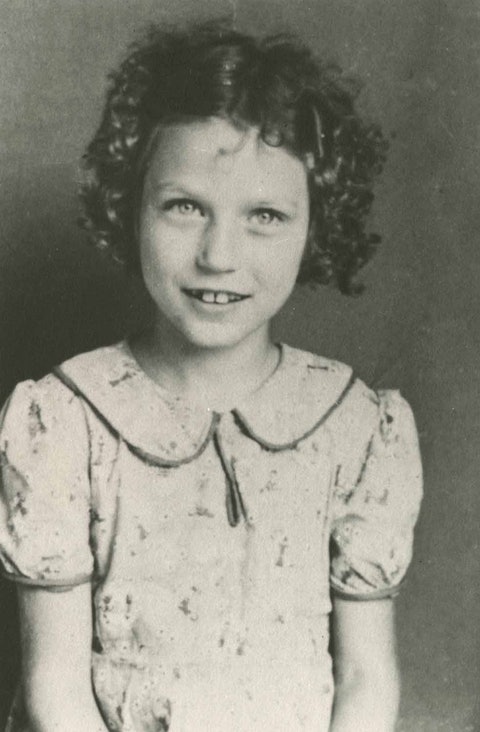
Loretta Lynn’s first-grade school photo.
-
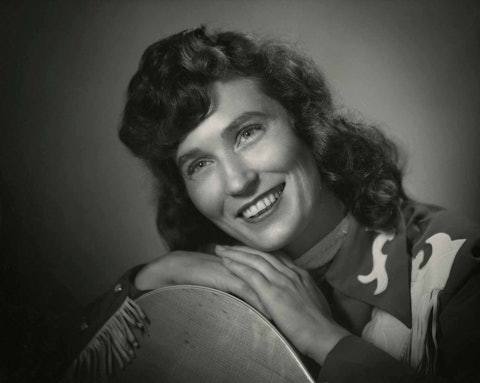
Loretta Lynn, early 1960s. Photo by Robert Brown.
-
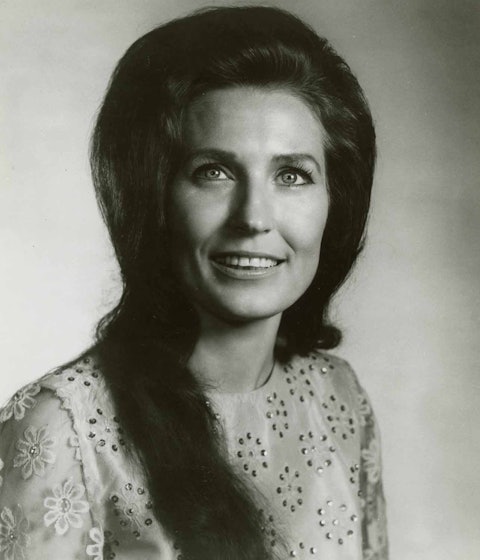
Loretta Lynn, 1970.
-
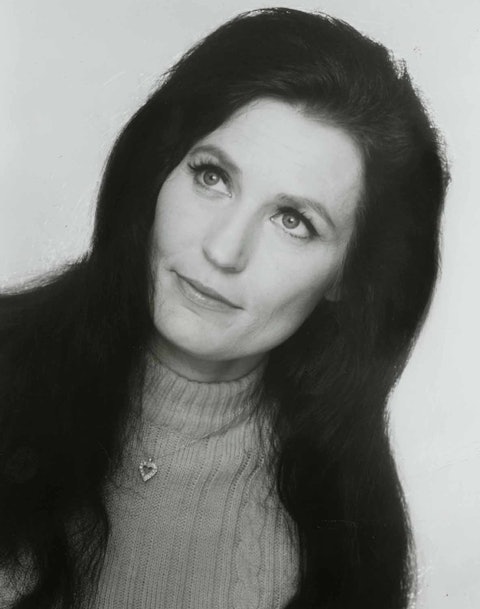
Loretta Lynn, early 1970s.
-
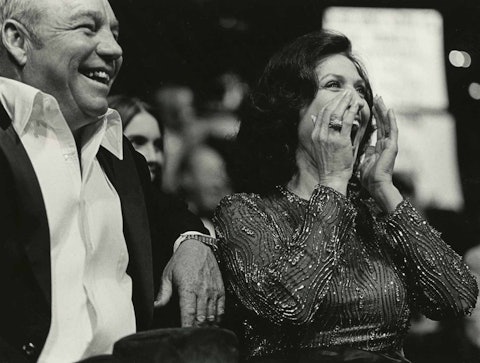
Oliver “Mooney” Lynn and Loretta Lynn, 1980. Photo by Don Putnam.
-
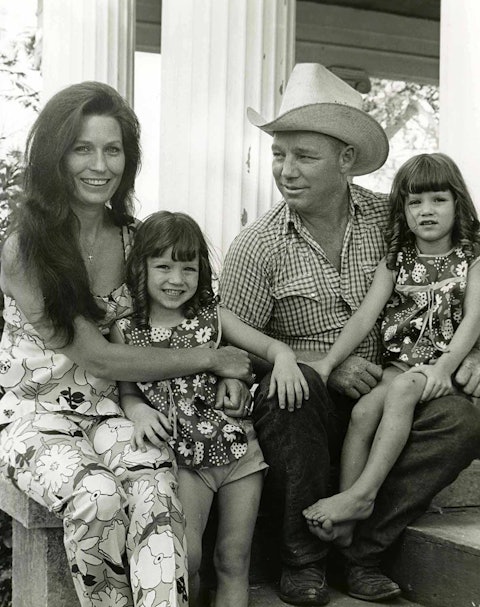
Loretta Lynn and husband Mooney with twin daughters Patsy (on Loretta’s lap) and Peggy, 1969.
-
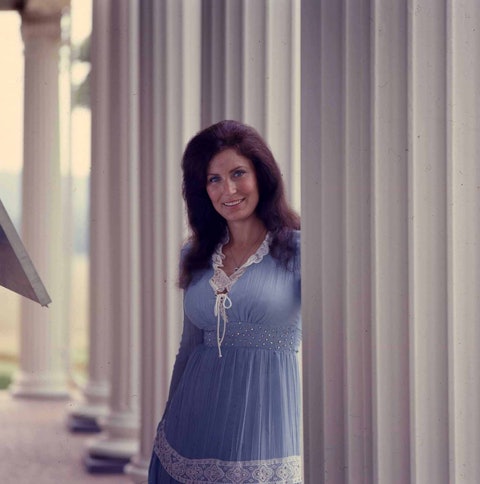
Loretta Lynn at home in Hurricane Mills, Tennessee, 1976. Photo by Leonard Kamsler.
-

Loretta Lynn in a publicity photo for her 1980 album Loretta.
-
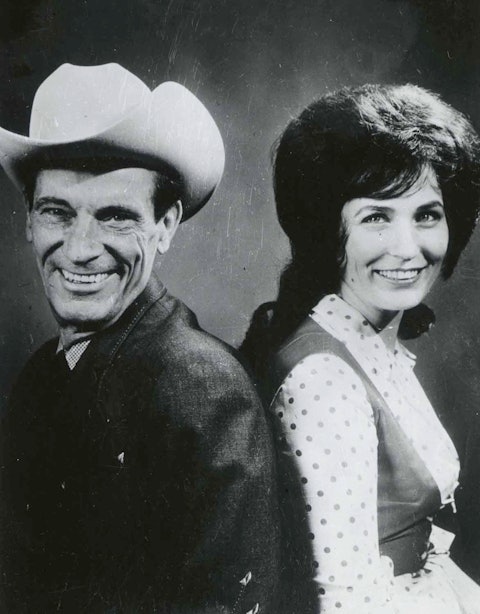
Ernest Tubb and Loretta Lynn in a publicity photo for their 1965 duet album, Ernest Tubb and Loretta Lynn.
-
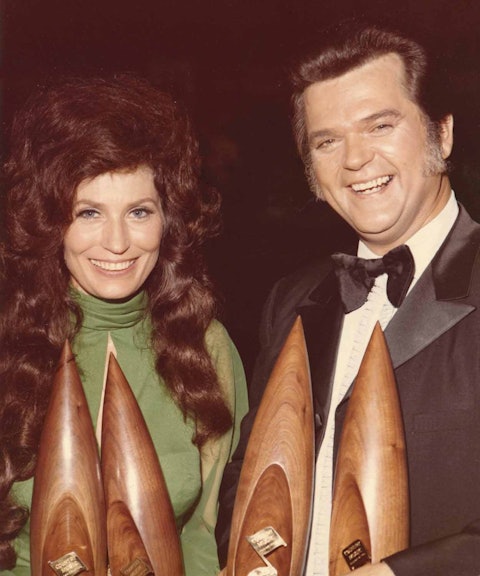
Loretta Lynn and Conway Twitty holding some of their Country Music Association Awards. They won CMA Duo of the Year awards four times running between 1972 and 1975. Photo by Hope Powell.
“Coal Miner’s Daughter,” Her Signature Song
In 1970, Lynn’s self-penned signature song, “Coal Miner’s Daughter,” became one of her biggest hits. She had made three albums of duets with Ernest Tubb before transitioning to recording duets with Conway Twitty. Her first song with Twitty, “After the Fire Is Gone,” topped the charts in 1971 and launched one of the most successful duet teams in country music history. Lynn and Twitty were the CMA’s Vocal Duo of the Year from 1972 through 1975. Among their many hits were “Lead Me On,” “Louisiana Woman, Mississippi Man,” and “Feelins’.” In 1972, Lynn became the first woman to receive the CMA’s Entertainer of the Year award.
Lynn’s autobiography, Coal Miner’s Daughter (1976), became a best seller and inspired a 1980 hit movie starring Sissy Spacek. Meanwhile, the singer continued to notch hits such as “Out of My Head and Back in My Bed,” “I’ve Got a Picture of Us on My Mind,” and the aptly titled “We’ve Come a Long Way, Baby.” “I Lie” (1982) was her fifty-first Top Ten hit, with sixteen #1s between 1966 and 1978. During that period, her younger sister, Brenda Gail Webb—better known as Crystal Gayle—became a successful recording artist in her own right. Her first single, in 1970, was a song written by big sister Loretta, “I’ve Cried the Blue Right Out of My Eyes.”
In 1988 Lynn was elected to the Country Music Hall of Fame. Following her husband’s death in 1996, she returned to solo recording after a hiatus of more than ten years. Audium Records released her album Still Country in 2000. She published her second autobiography, Still Woman Enough, in 2002, and in 2003 she received the prestigious Kennedy Center Honors for her lifetime contributions to the arts.
Her strong-selling 2004 album Van Lear Rose, produced by singer-guitarist Jack White of the rock duo the White Stripes, introduced her singing and songwriting skills to new audiences and won a Grammy for Best Country Album. It also took Album of the Year honors at the 2004 Americana Honors & Awards, at which Lynn was named Artist of the Year. Starting in 2009, with John Carter Cash producing, Lynn began rerecording her hits and cutting hew material. In 2021, she released her forty-sixth solo studio album, Still Woman Enough.
—Laurence Zwisohn
Adapted from the Country Music Hall of Fame® and Museum’s Encyclopedia of Country Music, published by Oxford University Press.
Loretta Lynn was the CMA’s Female Vocalist of the Year in 1967, 1972, and 1973. In these years, she began appearing on television variety programs and talk shows that had rarely featured country music performers because of her natural wit and vivacity.



